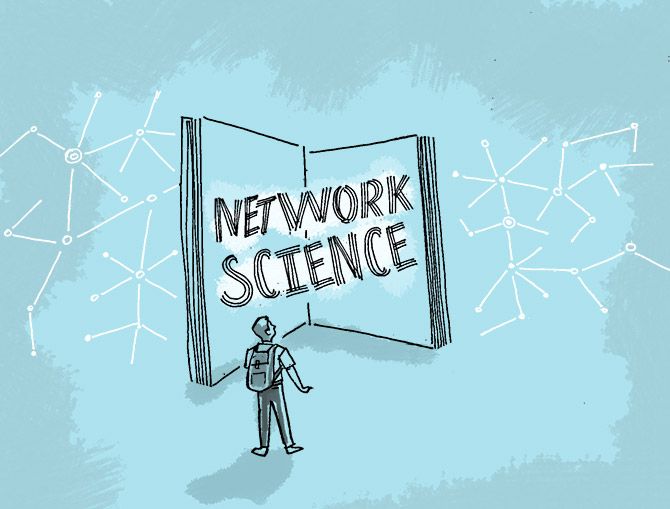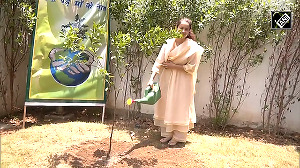Not just in the fight against COVID-19, but also in politics, economics and society, observes Ajit Balakrishnan.

Words such as 'infection', 'social distance', 'propagation', 'seclusion' and 'transmission' have suddenly become a part of common people's conversation, as well as keywords in speeches by political leaders.
When a COVID-19 infected person is discovered in a community, energetic efforts are launched by citizens and law enforcement authorities to locate the 'super-spreader' and trace, list and test everyone that person has been in touch with.
'Network Science' is suddenly being practised by people as humble as a rickshaw puller to people as lofty as heads of State. It is no longer the domain of just scholars of esoteric sciences.
Talk to anyone who has even a passing acquaintance with Network Science and he will tell you that networks are around all of us.
Some of these are familiar to practically everyone: Telecom networks and computer networks, for example. Telecom networks help us -- users of telephones -- to connect to one another using 'connectors' like telephone exchanges.
Computer networks help us connect by way of our personal computers and smartphones and allow us to send text messages, audio and video clips to other people.
We all know by now that while most of the time, telephone and computer networks do a wonderful job for us, they can occasionally be used by 'baddies' to eavesdrop on conversations, spread annoying commercial messages and even lure us into giving away our bank account numbers and passwords and steal money from us.
Then, there are networks less familiar to the average citizen but studied extensively by scholars, such as biological networks where proteins are seen interacting with each other (';Protein-Protein Networks') or 'DNA-Protein Networks', 'Gene Co-expression Networks', all of which are involved in the birth, growth and health of every form of living body, be it human, animal, bird or insect.
These networks have been the subject of study for decades by government and private sector laboratories.
And, of course, practically everyone nowadays has something to do with social networking sites on the Internet -- Facebook, LinkedIn, Twitter, to mention a few.
What is astonishing though is the discovery over the last two decades or so that all the above, apparently different networks -- telecom, biological, disease -- can be understood with the help of certain common concepts.
To start with, all networks have 'nodes' and 'edges'.
In the case of COVID-19, the nodes are us human beings, and the edges are what connect the edges together to make up the network.
These edges can be, in the case of landline telephones, actual physical cables; in the case of mobile phones, electronic signal; and in the case of human social networks, a psychological feeling of 'people-like-me'.
Scientists have also formulated other properties of networks: 'Size' (the number of nodes in that network), 'Density' (the number of actual connected nodes to the maximum connections possible), 'Degree' of a node (the number of other nodes connected to it) and 'Degree Centrality' (the extent to which a node acts as a bridge between other nodes).
All this may make you yawn and induce you to murmur, 'Let these scientists have fun with such complicated notions, but why should I bother to understand any of this stuff?'
Well, wait, things can get exciting when you apply it to networks between people.
Let's start with Old Boys Networks, the practice of hiring only those people in your firm who have gone to the same high school as you. This was widely prevalent in the multinational companies in India up to the late 1950s. You had to have gone to Doon School, St Paul's or Lawrence School before you even got a chance for an interview.
Researchers say that most social networks exhibit 'homophily' -- members of a network are prone to maintain relationships with those who are like themselves as measured by social class, race, gender, religion or profession.
Research in the United States says that 60 per cent of first jobs are found through such social networks.
More generally, researchers have found strong evidence of networks in labour markets, particularly in immigrant populations.
Then, of course, there are 'viral videos', videos on the Internet that suddenly catch the fancy of people who then keep forwarding them to friends and acquaintances: Some videos have achieved more than a 100 million views in a few days worldwide purely on the basis of their virality.
The specific processes at work that causes virality of this scale are, as yet, not fully understood though theories abound.
The finance sector has had its share of network catastrophes: 'Financial contagion' is the phrase used to describe this process and can happen at both the international and the domestic level.
The pattern observed so far is that these chain of failures in financial intermediaries are triggered by the failure of a domestic bank or financial intermediary and this failure is transmitted when it defaults on interbank liabilities and/or sells its assets at throwaway prices which brings into question the valuation of assets of similar banks.
And finally, there is this whole body of research which speaks of 'Network Effects' when a network effect is present, the value of a service to a person increases with the number of others using it.
For example, more the number of users using a credit card, more the number of shops who will accept it and hence even more users will use that credit card.
The contemporary venture capital industry is predicated on this faith in Network Effects.
Maybe, it is time for Network Science to be included in school and college syllabuses just as Physics, Chemistry, Botany, Mathematics, etc, and for it to become a required part in the times to come of counting a person as 'educated'.
Ajit Balakrishnan, (ajitb@rediffmail.com), founder and CEO, Rediff.com, is an Internet entrepreneur and chaired a committee set up by the ministry of human resource development on education and entrepreneurship last year to provide inputs for the National Education Policy.











